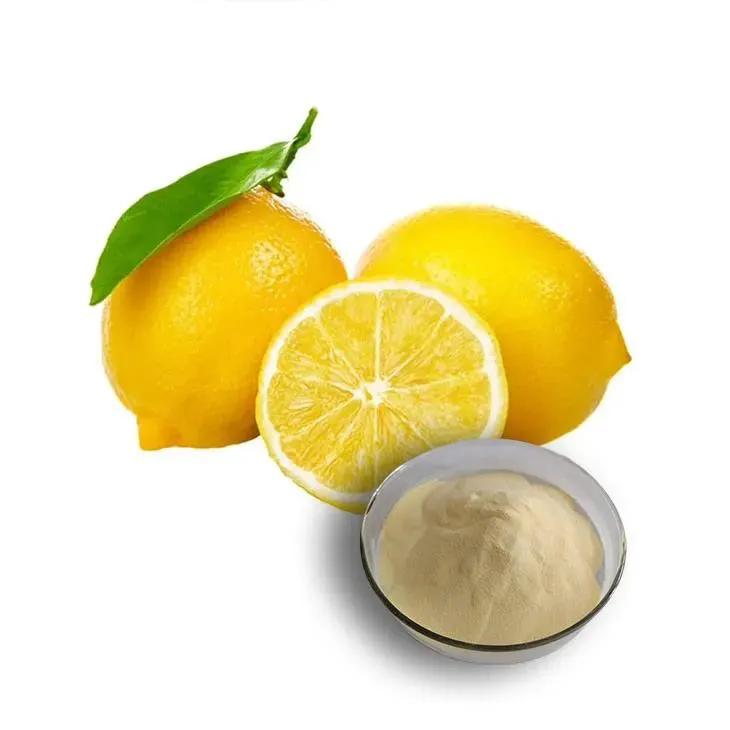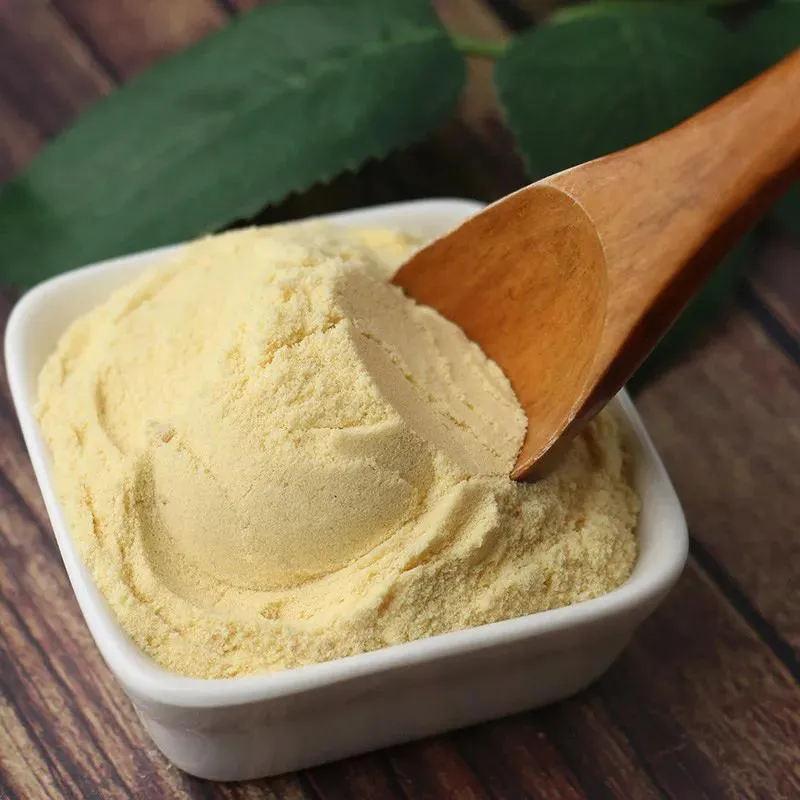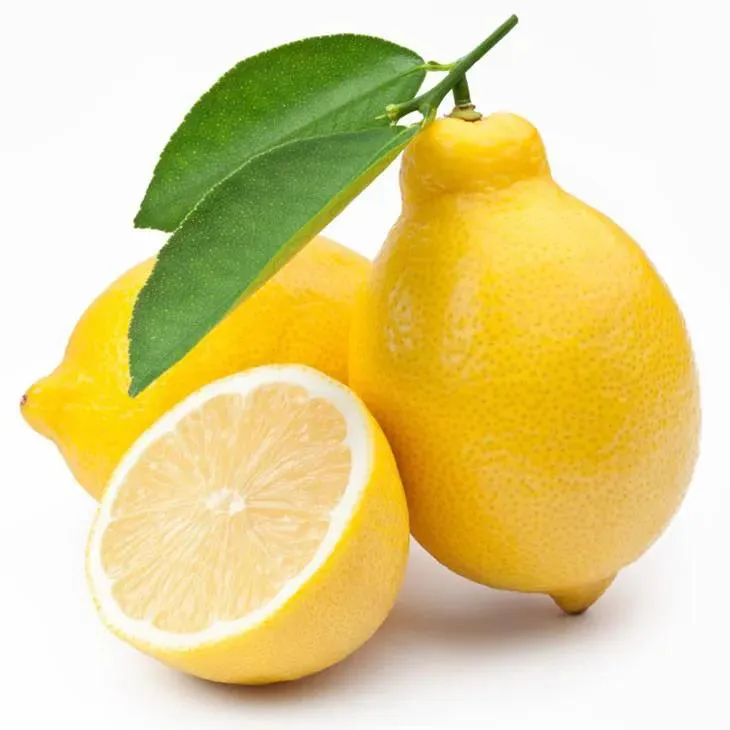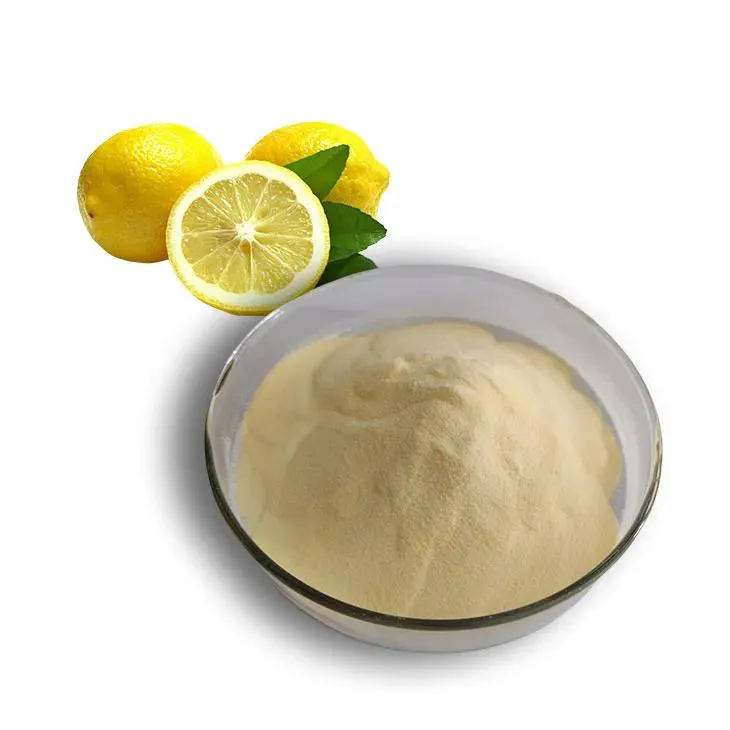- 0086-571-85302990
- sales@greenskybio.com
The process of extracting limonene from lemon juice powder.
2024-11-30

1. Introduction
Lemon Juice Powder is a concentrated form of lemon juice that has various applications in the food, beverage, and cosmetic industries. One of the valuable components that can be extracted from Lemon Juice Powder is limonene. Limonene is a cyclic terpene with a pleasant citrusy odor and has numerous applications, including as a flavoring agent, a solvent, and in the production of various chemicals. Understanding the process of extracting limonene from Lemon Juice Powder is crucial for optimizing its production and utilization.

2. Chemical properties of lemon juice powder relevant to limonene extraction
Lemon juice powder composition: Lemon juice powder contains a complex mixture of substances. Besides water - soluble components like sugars, acids (such as citric acid), and some vitamins, it also contains hydrophobic compounds. Limonene is a hydrophobic terpene hydrocarbon. It is present in the essential oil fraction of lemon juice.
Solubility characteristics: Limonene has very low solubility in water due to its non - polar nature. However, it is soluble in organic solvents such as hexane, ethyl acetate, and dichloromethane. This solubility difference is the basis for the extraction process, as it allows for the separation of limonene from the water - soluble components of the lemon juice powder.

3. The extraction process
3.1. Selection of solvent
Solvent polarity: The choice of solvent is a crucial factor in limonene extraction. As mentioned earlier, limonene is non - polar, so non - polar solvents are preferred. Hexane is a commonly used solvent due to its low polarity and high solubility for limonene. However, ethyl acetate can also be used, especially when a less toxic solvent is desired, although its solubility for limonene is somewhat lower.
Solvent - to - sample ratio: The ratio of solvent to lemon juice powder sample also affects the extraction efficiency. A higher solvent - to - sample ratio generally leads to a more complete extraction, but it also means using more solvent, which may not be cost - effective. A typical ratio might range from 5:1 to 10:1 (solvent: sample by volume).
3.2. Temperature
Effect on solubility: Increasing the temperature can enhance the solubility of limonene in the solvent. This is because, according to the principles of thermodynamics, an increase in temperature generally leads to an increase in the solubility of solutes in solvents. However, the temperature should not be too high, as it may cause the degradation of limonene or other components in the lemon juice powder. A temperature range of 30 - 50 °C is often considered suitable for extraction.
Energy consumption and practical considerations: Higher temperatures also mean higher energy consumption. In industrial settings, the balance between extraction efficiency and energy cost needs to be carefully considered. Additionally, some solvents may have safety concerns at higher temperatures, such as increased volatility and flammability.
3.3. Extraction time
Initial extraction rate: At the beginning of the extraction process, the rate of limonene extraction is relatively fast. As time progresses, the concentration gradient between the lemon juice powder and the solvent decreases, and the extraction rate slows down.
Optimal extraction time: Determining the optimal extraction time is important for maximizing the yield and quality of limonene. Typically, extraction times range from 1 - 3 hours. Prolonged extraction times may not significantly increase the yield and may lead to the extraction of unwanted impurities.

4. Impact of extraction factors on the yield and quality of limonene
4.1. Temperature
Yield: As mentioned before, increasing the temperature within a certain range can increase the yield of limonene. However, if the temperature is too high, the yield may actually decrease due to the degradation of limonene. For example, at temperatures above 60 °C, significant degradation of limonene has been observed in some studies.
Quality: High temperatures can also affect the quality of limonene. The citrusy odor of limonene may be altered if it is exposed to high temperatures for too long. Additionally, high - temperature extraction may introduce more impurities, which can affect the purity of the final limonene product.
4.2. Solvents
Yield: Different solvents have different solubilities for limonene, which directly affects the yield. Hexane, being a highly effective solvent for limonene, generally results in a higher yield compared to solvents with lower solubility. However, the choice of solvent also needs to consider factors such as toxicity, cost, and environmental impact.
Quality: The purity of the limonene product can also be affected by the solvent. Some solvents may leave behind residues that are difficult to remove completely, which can reduce the quality of the limonene. For example, if dichloromethane is used, it is necessary to ensure complete removal of the solvent to avoid any potential toxicity issues in the final product.
4.3. Extraction time
Yield: An appropriate extraction time is crucial for maximizing the yield. If the extraction time is too short, the limonene may not be fully extracted, resulting in a lower yield. On the other hand, if the extraction time is too long, as mentioned earlier, it may not significantly increase the yield and may introduce more impurities.
Quality: The quality of limonene can also be influenced by the extraction time. Longer extraction times may lead to the extraction of non - limonene components, which can reduce the purity of the final product.

5. Applications of extracted limonene
Food and beverage industry: Limonene is widely used as a flavoring agent in the food and beverage industry. It imparts a natural citrus flavor to products such as soft drinks, candies, and baked goods. Additionally, it can be used as a natural preservative due to its antimicrobial properties.
Cosmetic industry: In the cosmetic industry, limonene is used in perfumes, lotions, and other products for its pleasant citrus scent. It also has some skin - conditioning properties and can act as a solvent for other cosmetic ingredients.
Chemical industry: Limonene can be used as a starting material for the synthesis of other chemicals. For example, it can be converted into various terpene derivatives, which have applications in the production of polymers, adhesives, and resins.
6. Conclusion
The extraction of limonene from lemon juice powder is a complex process that is influenced by multiple factors such as solvent selection, temperature, and extraction time. Understanding these factors and their impact on the yield and quality of limonene is essential for efficient and high - quality extraction. With the increasing demand for natural products in various industries, the extraction of limonene from lemon juice powder has significant potential for further development and application.
FAQ:
What are the main chemical components in lemon juice powder relevant to limonene extraction?
Lemon juice powder contains various components. Limonene itself is a major terpene hydrocarbon present. Additionally, there are other organic compounds such as citral, which can have an impact on the extraction process as they may interact with limonene or the extraction solvents. There are also sugars, acids (like citric acid), and small amounts of proteins and lipids. These components can influence the solubility and separation of limonene during extraction.
How does temperature affect the extraction of limonene from lemon juice powder?
Temperature plays a crucial role. At lower temperatures, the solubility of limonene in solvents may be limited, leading to a lower extraction yield. As the temperature increases, the kinetic energy of the molecules rises. This can enhance the diffusion rate of limonene from the lemon juice powder into the solvent. However, if the temperature is too high, it may cause the degradation of limonene or other components in the lemon juice powder, which can negatively affect the quality of the extracted limonene.
Which solvents are commonly used for extracting limonene from lemon juice powder?
Common solvents used include hexane, ethyl acetate, and dichloromethane. Hexane is a non - polar solvent and is effective in extracting limonene as limonene is also relatively non - polar. Ethyl acetate has a moderate polarity and can be used when a more selective extraction is desired. Dichloromethane is another option, but its use may be restricted in some applications due to its toxicity. The choice of solvent depends on factors such as the desired purity of limonene, cost, and safety considerations.
How does extraction time influence the extraction of limonene?
Extraction time is an important factor. Initially, as the extraction time increases, the amount of limonene extracted also increases. This is because more time allows for the limonene to diffuse from the lemon juice powder into the solvent. However, after a certain point, the extraction reaches a saturation level. Continuing the extraction for a much longer time may not significantly increase the yield but can lead to the extraction of unwanted impurities, which can reduce the quality of the final limonene product.
What are the applications of the extracted limonene?
Limonene has a wide range of applications. In the food industry, it can be used as a flavoring agent due to its characteristic lemon - like aroma. In the cosmetics industry, it is used in perfumes, lotions, and other products for its pleasant smell. It also has potential applications in the pharmaceutical industry, for example, as a solvent or in drug delivery systems. Additionally, limonene can be used in the production of cleaning products as it has some solvent and degreasing properties.
Related literature
- Extraction of Terpenes from Citrus Fruits: A Review"
- "The Chemistry and Applications of Limonene: An Overview"
- "Optimization of Limonene Extraction from Citrus - Based Materials"
- ▶ Hesperidin
- ▶ citrus bioflavonoids
- ▶ plant extract
- ▶ lycopene
- ▶ Diosmin
- ▶ Grape seed extract
- ▶ Sea buckthorn Juice Powder
- ▶ Beetroot powder
- ▶ Hops Extract
- ▶ Artichoke Extract
- ▶ Reishi mushroom extract
- ▶ Astaxanthin
- ▶ Green Tea Extract
- ▶ Curcumin Extract
- ▶ Horse Chestnut Extract
- ▶ Other Problems
- ▶ Boswellia Serrata Extract
- ▶ Resveratrol Extract
- ▶ Marigold Extract
- ▶ Grape Leaf Extract
- ▶ blog3
- ▶ Aminolevulinic acid
- ▶ Cranberry Extract
- ▶ Red Yeast Rice
- ▶ Red Wine Extract
-
Tormentil Extract
2024-11-30
-
Shikonin
2024-11-30
-
Uridine-5'-monophosphate Disodium salt
2024-11-30
-
Reishi mushroom extract
2024-11-30
-
Curcumin
2024-11-30
-
Yam Extract
2024-11-30
-
Nettle leaf extract
2024-11-30
-
Cocoa Extract
2024-11-30
-
Oat Straw Extract Powder
2024-11-30
-
Acerola Extract
2024-11-30





















